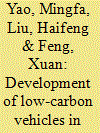|
|
|
Sort Order |
|
|
|
Items / Page
|
|
|
|
|
|
|
| Srl | Item |
| 1 |
ID:
109425


|
|
|
|
|
| Publication |
2011.
|
| Summary/Abstract |
Reducing CO2 emissions from vehicles in China is crucial and will significantly alleviate the environmental burden of the Earth. Some promising technologies that make possible low-carbon vehicles are reviewed in this work, including electric vehicles, fuel cell vehicles, hybrid vehicles, biofuels vehicles, other alternative fuel vehicles, and conventional internal combustion engine vehicles with improvement. In the short term, expanding the use of mature technologies in conventional gasoline or diesel vehicles is the most realistic, effective, and timely solution for China to meeting the urgent challenges of energy saving and greenhouse gas reduction; while in the long run biofuel is a promising candidate due to their renewability and carbon neutrality. The blueprint of low-carbon vehicles for China depends on three aspects: breakthroughs in technology, awareness of public, and government guidance.
|
|
|
|
|
|
|
|
|
|
|
|
|
|
|
|
| 2 |
ID:
133180


|
|
|
|
|
| Publication |
2014.
|
| Summary/Abstract |
In China, renewable/green electricity, which can provide significant environmental benefits in addition to meeting energy demand, has more non-use value than use-value for electricity consumers, because its users have no way to actually own this use-value. To assess the value of renewable electricity and obtain information on consumer preferences, this study estimated the willingness to pay (WTP) of Beijing residents for renewable electricity by employing the contingent valuation method (CVM) and identified the factors which affect their WTP. The survey randomly selected 700 participants, of which 571 questionnaires were valid. Half of respondents were found to have positive WTP for renewable electricity. The average WTP of Beijing residents for renewable electricity is estimated to be 2.7-3.3 US$ (18.5-22.5CNY) per month. The main factors affecting the WTP of the respondents included income, electricity consumption, bid and payment vehicle. Knowledge of and a positive attitude towards renewable energy also resulted in the relatively higher willingness of a respondent to pay for renewable electricity. The proportion of respondents replying "yes" to WTP questions using a mandatory payment vehicle was slightly higher than that for questions using a voluntary vehicle. Lastly, several policy implications of this study are presented.
|
|
|
|
|
|
|
|
|
|
|
|
|
|
|
|
|
|
|
|
|